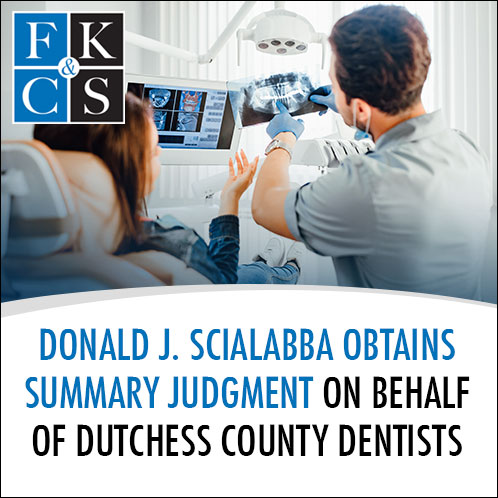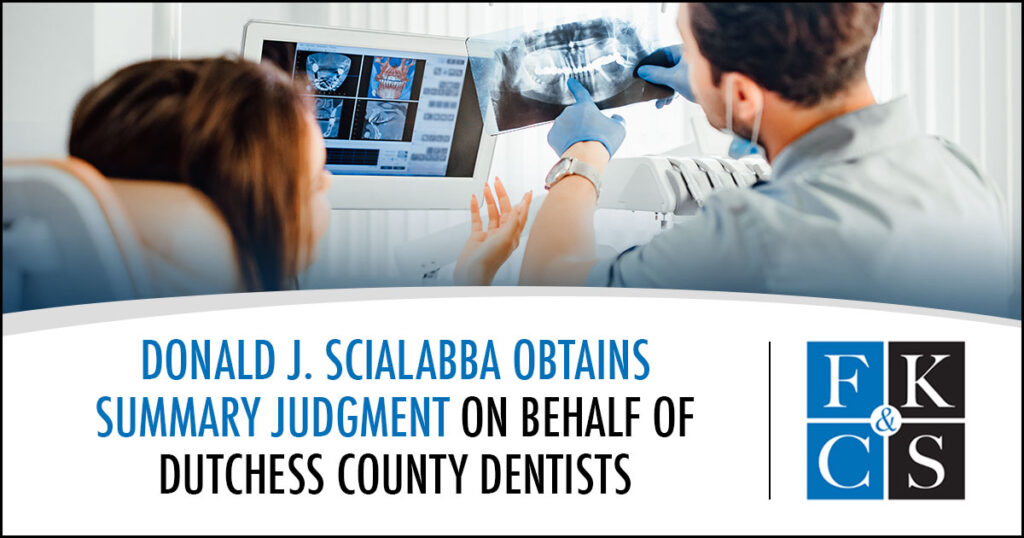 Donald J. Scialabba recently obtained a summary judgment dismissal for Feldman, Kleidman, Collins & Sappe LLP’s (FKC&S) clients, two associate dentists in the office of a Wappingers Falls dental practice.
Donald J. Scialabba recently obtained a summary judgment dismissal for Feldman, Kleidman, Collins & Sappe LLP’s (FKC&S) clients, two associate dentists in the office of a Wappingers Falls dental practice.
The plaintiff was first seen in the office of the dental practice on January 27, 2016, approximately two years before either of FKC&S’s clients became involved with his treatment. He was seen by another dentist at the office, who diagnosed that he had heavy calculus deposits, bleeding of the gums, deep periodontal pockets, periodontal disease and severe bone loss in his jaws. The dentist formulated a treatment plan to arrest the periodontal disease, including the extraction of some teeth as well as deep scaling and root planing of all four quadrants.
The plaintiff underwent the scaling and root planing but would not allow any teeth to be extracted. The treatment resulted in improvement of the periodontal disease for a time. However, because the plaintiff did not continue with proper home care and did not follow through with the other recommendations such as extractions of teeth, root canal therapy and implants, his condition deteriorated.
One of FKC&S’s clients first saw the plaintiff on November 7, 2018. He noted that the plaintiff did not want bridges placed in his mouth to replace teeth that were missing or needed to be extracted, so he recommended implants at certain locations. The plaintiff wanted orthodontic treatment to straighten his teeth and FKC&S’s client told him that if he wanted that treatment, it should be done prior to placing implants. He then referred the plaintiff to an orthodontist for evaluation for such treatment.
FKC&S’s client advised the plaintiff, as had been done in the past, that teeth 1, 15 and 22 should be extracted because of mobility from the periodontal disease. He also warned him about the consequences of not undergoing the recommended treatment. Once again, the plaintiff said that he wanted to wait to have the extractions done. FKC&S’s client was aware that the plaintiff was scheduled to undergo further deep scaling and root planning of all four quadrants in December, pursuant to the treatment plan that had been formulated by the first dentist. He also recommended that the plaintiff be seen by the periodontist in the office to have his periodontal condition evaluated regarding the placement of an implant at 22.
FKC&S’s second client first saw the plaintiff in December 2018 when he administered the anesthetic so the hygienist could perform the deep scaling and root planing. He saw the plaintiff again in March 2019 when he came to the office because tooth 15 had broken. This was one of the teeth for which extraction had been previously recommended, but the plaintiff refused to have it extracted or restored. FKC&S’s client smoothed the sharp edges of the tooth, and the plaintiff was subsequently seen by the periodontist in the office in May 2019. It was noted that there had been improvement in his periodontal condition at that time because the pockets had decreased in size.
FKC&S’s second client saw the plaintiff on August 28, 2019, and noted that the periodontal disease had worsened at that time, again recommending extraction of teeth 1, 15 and 22, and that he should be seen by the periodontist in the office. The plaintiff never returned to the office.
The plaintiff claimed that FKC&S’s clients should not have provided or recommended any treatment and should have immediately referred him to a periodontist for treatment of his severe periodontal disease. Scialabba argued that the plaintiff’s periodontal disease was being treated successfully by the original dentist’s plan but was dependent on proper home care. His condition worsened when he stopped the home care and failed to undergo the other recommended treatment.
The standard of care did not require that either of FKC&S’s clients modify or countermand the treatment plan that was in place to treat his periodontal disease. Both referred him to a periodontist, who saw him in the office. The court noted that he had severe periodontal disease from his first visit with the Wappingers Falls dental practice. Therefore, it was not the treatment provided by FKC&S’s clients that caused the periodontitis. Furthermore, the court stated that the plaintiff’s expert failed to address the arguments that the periodontal disease was not arrested because of his refusal to undergo the other treatments recommended to him.

